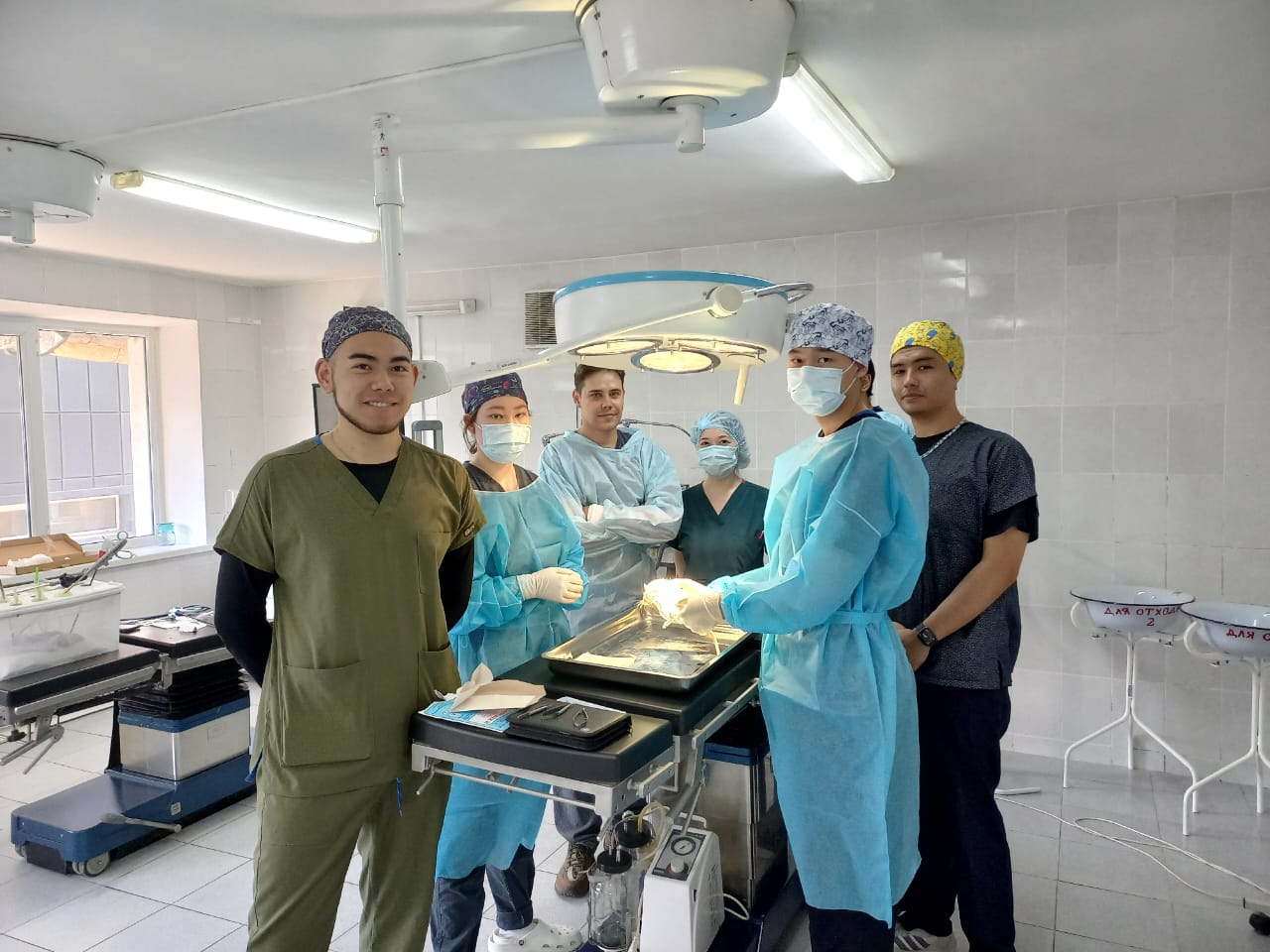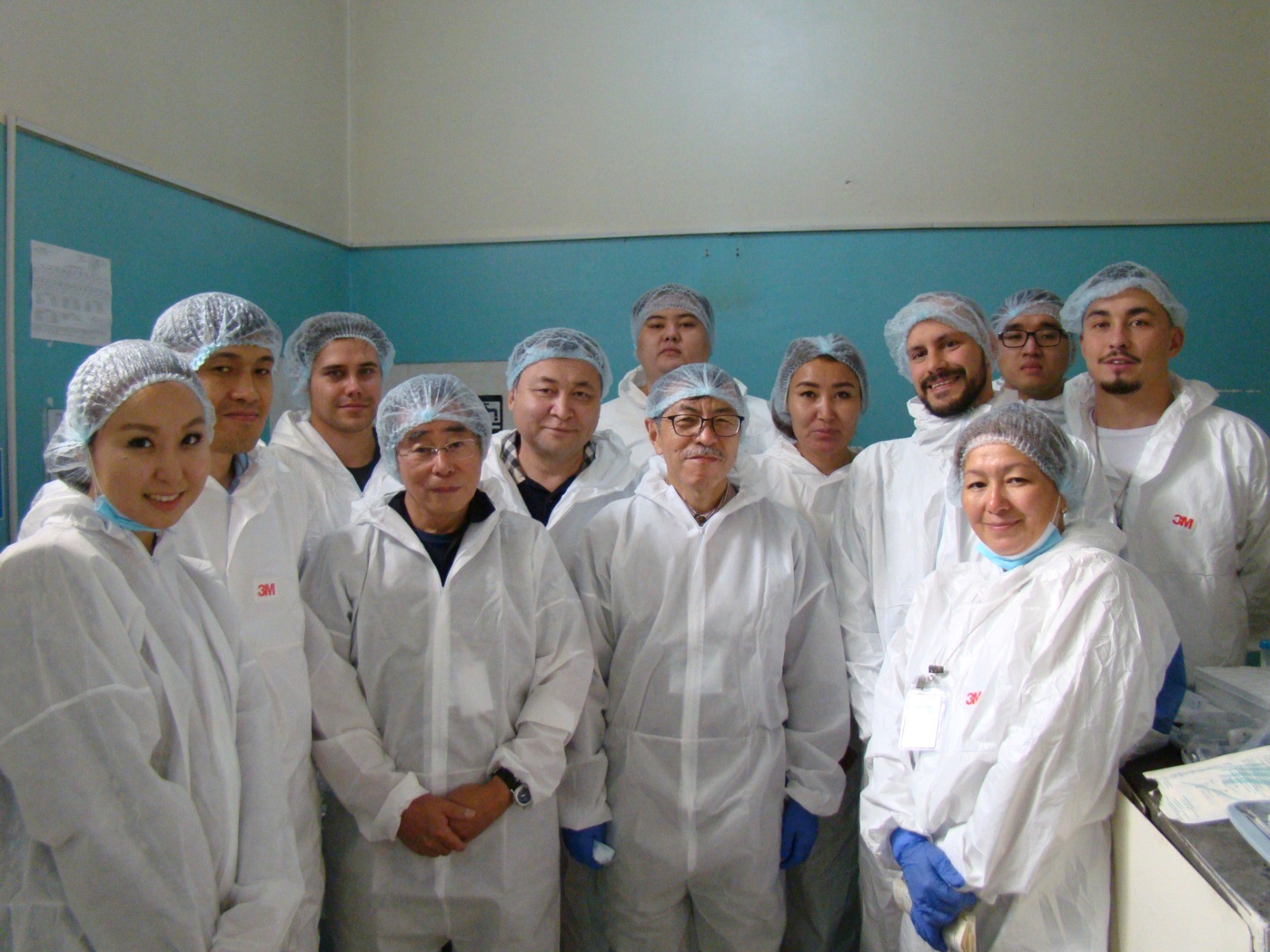Introduction
Laboratory of Experimental Medicine is a scientific, methodological and educational support unit of the University, created on the basis of the rector’s order No. 255 dated 07/08/08 in order to ensure the educational process for students to master practical skills, as well as to improve the level and quality of scientific research in terms of clinical and experimental substantiation , testing of treatment methods and preclinical testing of new drugs.
Main tasks of the laboratory:
- Assistance in achieving the university’s strategic plan in the field of quality training;
- Training students to acquire basic practical skills in experimental work;
- Training of doctors — interns, surgeons, obstetricians, dentists to acquire surgical equipment on animals.
- Organization of training and consulting for young scientists and students on conducting experimental research in medicine;
- Organizing and conducting an examination of the experimental section of completed research work by employees.
- Development, scientific substantiation and implementation of innovative diagnostic and treatment technologies in experimental conditions;
- Involving students in scientific research;
- Development and preparation for publication of educational and methodological developments for mastering skills by students studying.
- Conducting training seminars on conducting experimental research, on observing humane treatment of animals in accordance with the requirements for conducting experimental work.
When carrying out their activities, LEM employees are guided by:
- University Charter;
- legislative and other regulatory legal acts of the Republic of Kazakhstan, current standards, international norms, normative documents and methodological materials on issues related to the scope of activity of LEMs;
- contractual obligations of the University to third parties on issues related to the scope of activity of LEM;
- established requirements for the results of work: plans, estimates and others;
- Internal labor regulations;
- Internal educational regulations;
- approved documents of the quality management system and other internal regulatory documents of the University (regulations, instructions, rules, standards and others);
- decisions of the Academic Council of the University;
- orders and instructions of the rector of the University;
- orders and instructions of the senior manager and vice-rectors in the relevant areas of the University’s activities;
- instructions from state supervisory and control bodies;
Resources
LEM is located on the first and second floors of a 4-story building with an area of 211.6 square meters. On the ground floor (146.9 sq.m.) there are operating unit No. 1 (40.6 sq.m.), manipulation room — 2 rooms (28.9 sq.m.), autoclave room (14 sq.m.), office nurses (8 sq.m.), office of the head of the LEM (20 sq.m.), office of the LEM laboratory technicians (20 sq.m.). On the second floor there is a pathology laboratory (40.7 sq.m.), a training room (19.6 sq.m.).
To realize the multifaceted interests of experimental science, operating rooms, manipulation rooms for minor surgical procedures, and an autoclave to provide sterile surgical instruments and dressings have been created on the basis of LEM.Modern laboratory equipment, instrumentation, computer hardware and software, their active use for educational and research purposes;
The purpose and objectives of the development of the Laboratory of Experimental Medicine
The strategic goal of implementing this Concept is to increase the laboratory’s contribution to the modernization of specialist training through the development of research and innovation activities.
Course towards cardinal modernization of the laboratory requires not only the availability of highly specialized personnel, but also adequate funding, which involves solving the following problems:
- a new quality of training for specialists who have the skills to work with modern equipment in conditions that are closest to practical healthcare.
- The participation of students in research from the first year will contribute to the formation of a systematic approach to acquiring new knowledge among students.
- Strengthening the elective part of educational programs with disciplines that contribute to professional development, development of social and personal competencies of students.
- Conducting research work both independently and jointly with other departments of KazNMU.
- Ensuring that all experimental studies and operations on experimental animals are carried out in accordance with compliance with research and development plans.
- Conducting tests of new equipment, drugs and materials both for experimental laboratories and for surgical clinics.
- Production of histological preparations.
- Implementation of the “Learning through Inquiry” program.
Solving the identified problems without a significant increase in staffing levels and proper funding is not possible.
Main directions and stages of implementation of the Concept
New approaches to the development of research and innovation activities require systemic changes in the activities of the experimental laboratory.
Such changes concern both the organization of research based on LEM and the content and methods of the educational process.
At the same time, increasing the fundamental nature of education, in the traditional sense of mastering more and more general academic knowledge, also does not change the situation, since it does not give students the opportunity to master ways to update and master practical skills.
In this regard, the role of student participation in education is increasing the practical component of learning using opportunities LEMs that give:
- “see” your future professional activity in dynamics, comprehend the importance of mastering practical knowledge;
- gain experience of intensive practical work;
- clarify the direction of your future professional activity, the profile of the education you are receiving;
- work more meaningfully, purposefully and motivated in the operating room.
International experience, as well as the experience of leading Russian universities, allows us to outline the expected steps and possible actions for the development of research and innovation activities in the following main areas:
- personnel policy;
- interaction with a real clinic
- modernization of the educational process by mastering practical skills by students.
LEM management
Head of the laboratory — manages all LEM activities, ensures the organization of its work, performance of tasks and functions defined by the Regulations;
Structure and composition
All Laboratory employees are organized into groups, which, as a rule, are headed by Laboratory scientists. The work is organized in such a way that work is carried out in parallel in certain groups (excluding work on monographs, articles, etc.). Each group brings together participants with different levels of qualifications, which contributes to the transfer of research experience, training of young highly qualified personnel and researchers on relevant topics.
Head of laboratory — the position is currently vacant
Kulimbet M.B. — Chief Researcher
Tanabaeva Sh.B. — Researcher
Fazylov T.R. — junior researcher
Aitbekov B.K. — junior researcher
Zhumakhanova A.A. — Senior Assistant
Muratova K.A. — nurse
Global trends in the development of research and innovation activities
The so-called global research university model has been widely replicated.
The principal features of this model are:
- students’ mastery of basic competencies in research and innovation activities through their inclusion in relevant practices;
- a full-fledged transition to a level system of higher professional education “bachelor-master”, which involves the active use of students, primarily master’s degrees, as the most important “workforce” for research and development;
- real inclusion of the majority of teachers in research and innovation activities;
- interdisciplinarity of research and development;
- formation of innovative production and organization of innovative enterprises;
- conducting internships in foreign scientific and international centers, publishing scientific research results in leading foreign journals.
Research activities of LEM employees
LEM employees actively participate in research as part of the implementation of national, international, and intra-university scientific projects. The LEM team participates in research work under the scientific and technical program “National Program for the Introduction of Personalized and Preventive Medicine in the Republic of Kazakhstan” of the Ministry of Health of the Republic of Kazakhstan (implementation period 2021-2023). Among intra-university projects, laboratory staff are members of the temporary research team of the research project “Potential antiviral activity of protease inhibitors against COVID — 19 / SARS — CoV — 2” (implementation period 2022-2023). Regarding participation in foreign projects, LEM researchers are involved in large-scale research projects, such as COVID 19: CovidSurg, CovidSurg-Cancer, GlobalSurg- CovidSurg Week:, ESCP Safe Anastomosis Program in Colorectal Surgery (EAGLE), The Vascular Surgery COVID- 19 Collaborative (VASCC), Transurethral REsection and Single instillation intra-vesical chemotherapy Evaluation in bladder Cancer Treatment (RESECT), Global Neurotrauma Outcomes Study: Spine, Global Burden of Disease (GBD) and NCD.
LEM employees are co-authors of more than 30 publications in international journals included in the Scopus and Web of Science databases, and are also part of the team of authors of numerous publications in journals recommended by the Committee for Education and Science of the Ministry of Education and Science of the Republic of Kazakhstan and protection documents (patents of the Republic of Kazakhstan, international patents and copyright certificates).

Surgical unit


Performing laparoscopic surgery on a laboratory animal in the conditions of the LEM operating unit

Conducting the Republican interuniversity student Olympiad in surgery

Conducting an experimental operation by doctoral students as part of a dissertation research

Практическое занятие студентов кафедры «Технология фармацевтического производства»

Conducting training on “surgical instruments” for students

Preparation of the participants of the community of the Department of Topographic Anatomy and Operative Surgery «CAOSalmaty» for the international student Olympiad «New surgical challenges of Russia-23»

Work together with the Fukushima Institute and the Nazarbayev Institute on the basis of the Almaty Nuclear Institute

Collection of organs and venous blood for further laboratory research by LEM staff

The sterilization process of surgical instruments in the laboratory

Congratulations to the laboratory staff with New Year celebration from the University Trade Union
